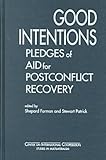Good Intentions : Pledges of Aid for Postconflict Recovery / ed. by Steward Patrick, Shepard Forman.
Material type: TextPublisher: Boulder : Lynne Rienner Publishers, [2023]Copyright date: ©2000Description: 1 online resource (432 p.)Content type:
TextPublisher: Boulder : Lynne Rienner Publishers, [2023]Copyright date: ©2000Description: 1 online resource (432 p.)Content type: - 9781555878542
- 9781685852030
- online - DeGruyter
| Item type | Current library | Call number | URL | Status | Notes | Barcode | |
|---|---|---|---|---|---|---|---|
 eBook
eBook
|
Biblioteca "Angelicum" Pont. Univ. S.Tommaso d'Aquino Nuvola online | online - DeGruyter (Browse shelf(Opens below)) | Online access | Not for loan (Accesso limitato) | Accesso per gli utenti autorizzati / Access for authorized users | (dgr)9781685852030 |
Frontmatter -- Contents -- Acknowledgments -- 1 Introduction -- 2 The Donor Community and the Challenge of Postconflict Recovery -- 3 Cambodia -- 4 El Salvador -- 5 Mozambique -- 6 The Palestinian Territories -- 7 South Africa -- 8 Bosnia and Herzegovina -- 9 Beyond Good Intentions: External Assistance and Peace Building -- List of Acronyms -- Bibliography -- The Contributors -- Index -- About the Book
restricted access online access with authorization star
http://purl.org/coar/access_right/c_16ec
This comparative study assesses the causes—and consequences—of failures to fulfill pledges of aid to postconflict societies. In each of six case studies, the coauthors (drawn from both donor states and recipient countries), evaluate multilateral efforts to support sustainable recovery and peacebuilding in societies emerging from protracted violence. They first establish the timing, composition, and objectives of aid pledged by the donor community. They then analyze the conditions that donors placed on their assistance, the mechanisms they created to coordinate it, and donor performance in delivering it. Next, they evaluate the recipient's ability to absorb external assistance and the impact that this aid has had for reconstruction and peacebuilding goals. Finally, they assess the causes, consequences, and lessons of any gaps between pledges and disbursements. What explains shortfalls in aid disbursement? And what do these recent experiences suggest for improving the multilateral design, mobilization, and coordination of assistance to postconflict societies? Good intentions notwithstanding, inadequate preparation, poor coordination, and lack of perseverance can threaten the recovery of vulnerable polities whose collapse would endanger regional peace and security.
Mode of access: Internet via World Wide Web.
In English.
Description based on online resource; title from PDF title page (publisher's Web site, viewed 02. Mai 2023)


